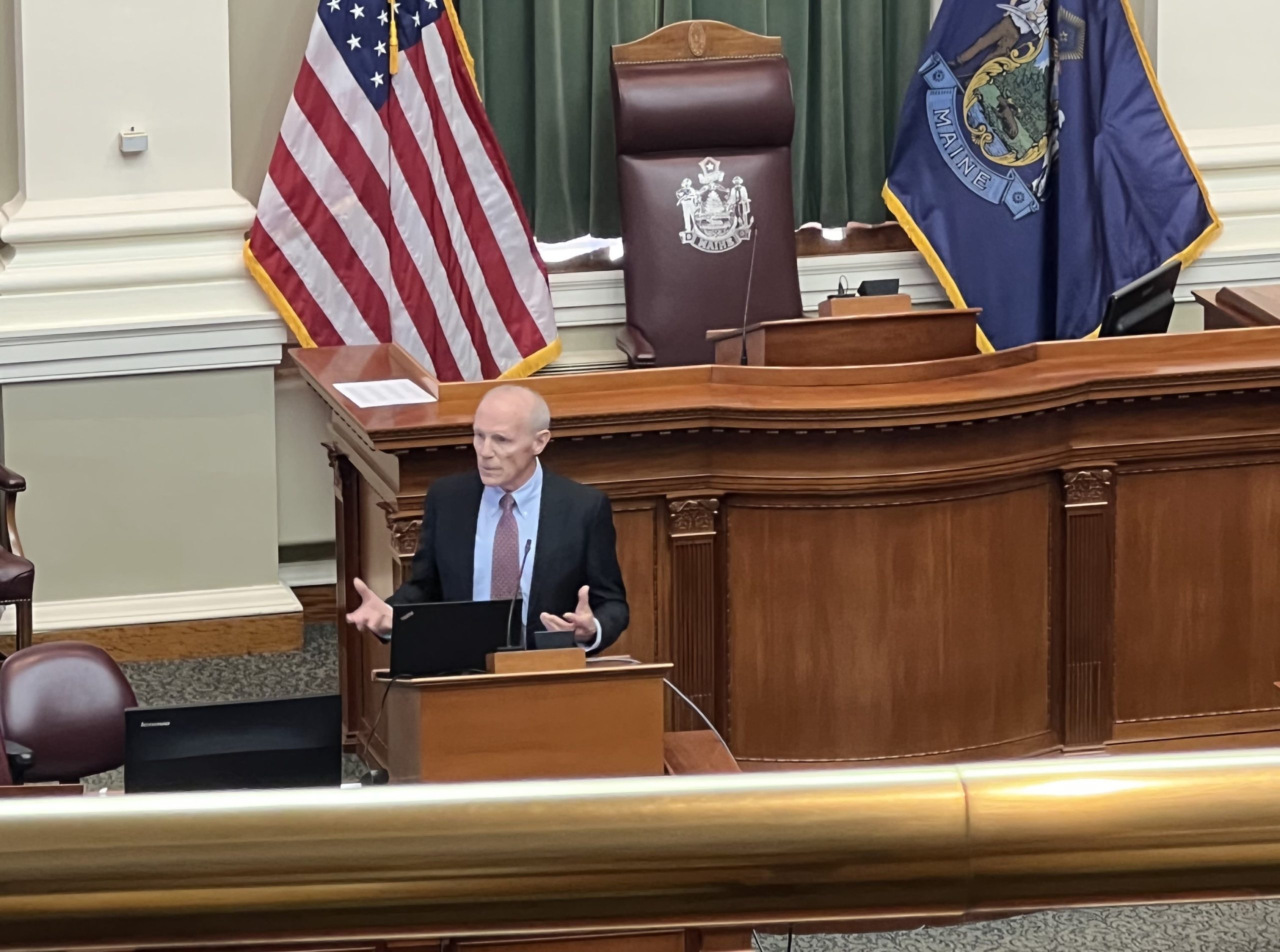Joseph P. Kalt, principal co-author of a report by the Harvard Project on American Indian Economic Development on the Wabanaki Nations, led a briefing on the report for the Maine Legislature.
In a March 9 briefing to the Maine Legislature, a Harvard researcher told lawmakers that the Wabanaki Nations could become “economic engines” for rural Maine if the 1980 Maine Indian Claims Settlement Act (MICSA) is modernized to remove the handcuffs it imposes on powers of self-government.
“In the rest of the U.S., getting the federal and state governments out of the lives of tribes and allowing tribes to govern themselves has produced a boom of economic self-sufficiency for American Indian nations,” said Joseph P. Kalt, principal co-author of a 69-page report by the Harvard Project on American Indian Economic Development, based in the Ash Center for Democratic Governance and Innovation at the Harvard Kennedy School. The report details economic opportunities that have been lost to the Maliseet, Mi’kmaq, Passamaquoddy and Penobscot Nations and rural Maine due to the 1980 Maine Indian Claims Settlement Act.
“Handcuffed by MICSA, the tribes in Maine have been left out of the economic resurgence occurring in the rest of the lower 48 states,” Kalt continued. “This not only perpetuates poverty and dependence among the Wabanaki, it also represents lost opportunity for all of Maine.”
Kalt co-directs the Harvard Project on American Indian Economic Development and has published widely on economic development policies impacting the 574 federally recognized tribes in the United States.
Kalt was invited to speak to the Legislature by House Speaker Rachel Talbot Ross, (D-Portland), Senate President Troy Jackson (D-Allagash) and House Minority Leader Billy Bob Faulkingham (R-Winter Harbor). Kalt’s one-hour presentation sets the stage for a “State of the Tribes Address” by Wabanaki chiefs to a joint session of the Maine Legislature, which is scheduled for March 16. It also comes as legislators prepare to consider a tribal sovereignty bill that will be introduced during the current session of the 131st Legislature.
“It is of the utmost importance to build off of the work of recent legislative leadership to improve the relationship with tribal government,” said House Speaker Talbot Ross. “Professor Kalt’s presentation was an opportunity to provide critical context for the Legislature to consider regarding the ongoing economic repercussions for the Wabanaki Nations as a result of the Maine Indian Claims Settlement Act. I am both thankful to Professor Kalt and to my colleagues from both parties for being engaged in the ongoing work to improve the well-being of not only tribal citizens, but all of Maine.”
“It is important that our members have information like this as we consider proposals that affect the Wabanaki Nations and other tribes,” Faulkingham stated. “Our task as legislators is to make Maine a place where everyone can succeed. I thank those who made today’s presentation possible.”
Some highlights of Kalt’s presentation:
- Whereas per-capita income for non-Maine tribes has grown by 61 percent between 1989-2020, it has barely advanced for the Wabanaki Nations, which have seen only 9 percent growth for the same period.
- “The Wabanaki Nations are quite systematically economically underdeveloped relative to the rest of Maine” and “all four of the tribes in Maine — Maliseet, Mi’kmaq, Passamaquoddy, and Penobscot — are stark economic underperformers relative to the other tribes in the Lower 48 states.”
- “The subjugation of the Wabanaki Nation’s self-governing capacities (due to the Settlement Act) is blocking economic development to the detriment of both tribal and non-tribal citizens, alike.”
- Under the 1980 Settlement Act, “Maine is leaving thousands of jobs, hundreds of millions of dollars of gross state product and tens of millions of dollars of state and local government revenue on the table.”
- If the Settlement Act’s restrictions are lifted, enabling the Wabanaki Nations to take full advantage of federal policies and programs supporting self-determination, “experiences of tribes elsewhere in the country supports the expectation that “there’s nowhere to go but up” for both tribal and non-tribal citizens.”
“It was an important presentation,” said Rena Newell, chief of the Passamaquoddy Tribe at Sipayik, who served as the tribe’s representative in the Maine House during the 130th Legislature. “I’m hoping it can be made available to additional audiences. It offers us hope that there can be a much better relationship with the state than what we’ve seen in the past 40 years.”
Maulian Dana, tribal ambassador for the Penobscot Nation and president of the Wabanaki Alliance, said Kalt offered persuasive evidence that policies encouraging tribal self-determination have been “an amazing success story” among tribal communities across the country, including many that are located in rural areas. “Maine is the outlier, and, as Dr. Kalt showed lawmakers today, it’s due to the obstacles MICSA places on the Wabanaki Nations. It doesn’t have to be that way. A better story than the one we’ve seen over the past 40 years is possible.”







